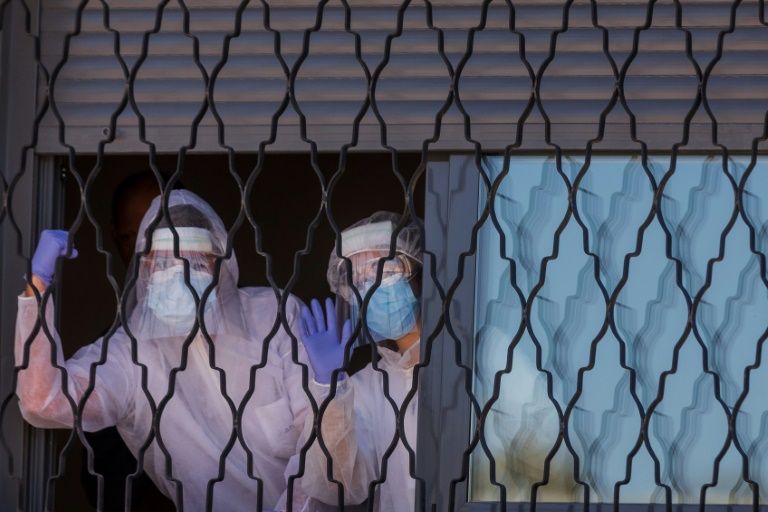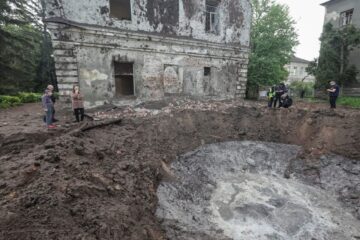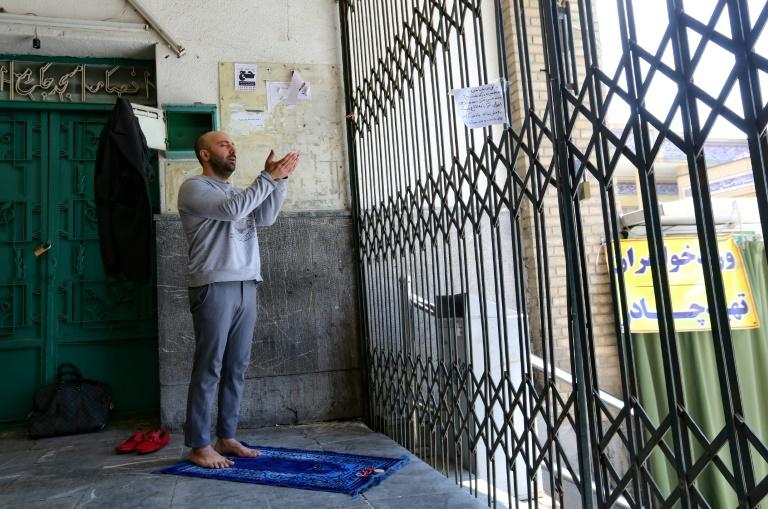Italy, Spain suffer record virus deaths as British PM tests positive
 Spain reported its death toll was nearly 5,000 (AFP Photo/BALDESCA SAMPER)
Spain reported its death toll was nearly 5,000 (AFP Photo/BALDESCA SAMPER)Italy on Friday recorded the most daily deaths of any country since the start of the coronavirus pandemic and Spain had its deadliest day, as British Prime Minister Boris Johnson became the first major world leader to test positive.
Italy reported 969 new deaths and Spain 769, as Europe reeled from a crisis that has put millions at risk around the world and threatened a global economic meltdown.
In other grim milestones, AFP tallies showed a total of 300,000 cases now recorded in Europe with more than 25,000 deaths worldwide, and the United States overtook China as the country with the most infections.
Italy showed infection rates continuing a downward trend and Spain said its rate of new infections appeared to be slowing, but other countries were bracing to feel the full impact of the virus’s spread.-
The World Health Organization’s regional director for Africa warned the continent faced a “dramatic evolution” of the pandemic, as South Africa became the latest nation to start life under lockdown and reported its first COVID-19 deaths.
Johnson, whose country has seen more than 14,000 declared coronavirus cases and 759 deaths, said he had developed mild symptoms over the previous 24 hours and was self-isolating after testing positive.
Britain’s Health Secretary Matt Hancock also tested positive with mild symptoms.
Europe has suffered the brunt of the coronavirus crisis in recent weeks, with millions across the continent on lockdown and the streets of Paris, Rome and Madrid eerily empty.
– ‘She just had a cough’ –
In France — where nearly 1,700 people have died — the government announced it was extending its stay-at-home order until at least April 15.
“We find ourselves in a crisis that will last, in a health situation that will not improve any time soon,” Prime Minister Edouard Philippe said.
The death of a 16-year-old girl from the virus has particularly shaken France, and shattered the belief of many young people that they are immune.
The girl’s mother Sabine told AFP that Julie “just had a cough” at first but deteriorated quickly. She died on Wednesday, less than a week after showing her first symptoms.
“It’s unbearable,” Sabine said. “We were supposed to have a normal life.”
Focus was also turning to the United States, where the number of known infections reached more than 92,000, higher than both China and Italy.
In New York City, health workers are battling a surging toll of dead and infected at the US epicentre of the crisis, including an increasing number of younger patients.
“Now it’s 50-year-olds, 40-year-olds, 30-year-olds,” said one respiratory therapist at the Jewish Medical Center in Queens.
– ‘They didn’t listen’ –
They “didn’t listen about not going out or protecting themselves and washing their hands”, he said.
“To watch somebody in their 30s die, it’s hard. You can’t have visitors. They’re in the room by themselves on a ventilator. It’s very depressing.”
The coronavirus first emerged in China late last year before spreading globally, with more than half a million declared cases in 183 countries and territories.
Every day, scientists and epidemiologists pore over the exponential growth of the pandemic to see if they can get ahead of the curve to limit the spread.
Over the last six days, as many new cases have been diagnosed around the world as in the previous 80 days.
Beijing managed to contain its spread with lockdowns and quarantines and its epicentre Wuhan is in the process of easing severe movement restrictions in place for two months.
Three billion people around the world have been told to stay indoors, upending normal life across the world.
Health care systems even in the most developed nations are stretched to breaking point and medical workers have been having to make difficult choices.
“If I’ve got five patients and only one bed, I have to choose who gets it,” Sara Chinchilla, a paediatrician at a hospital near Madrid, told AFP.
The WHO’s chief Tedros Adhanom Ghebreyesus said the dire lack of protective gear for frontline health workers was one of the most pressing problems in the fight to prevent deaths.
“The chronic global shortage of personal protective equipment is now one of the most urgent threats to our collective ability to save lives,” he told a virtual news conference in Geneva.
Lockdowns and other measures are wreaking havoc on the global economy, with fears of a downturn worse than the Great Depression of the 1930s.
“It is clear that we have entered a recession” that will be worse than in 2009 following the global financial crisis, International Monetary Fund chief Kristalina Georgieva said Friday.
Leaders from the Group of 20 major economies held crisis talks by video link on Thursday, announcing a $5 trillion financial rescue package “to counteract the social, economic and financial impacts of the pandemic”.
Unprecedented stimulus measures have helped markets bounce back after a brutal month, but people around the world are bracing for economic hardship.
The United States reported that 3.3 million people applied for unemployment benefits last week — by far the highest number ever recorded.
Retail workers in particular have suffered as many countries shutter non-essential business, while airlines and the global tourism industry have been dealt devastating blows.
– Armies of volunteers –
The World Tourism Organization said Friday it expected tourist arrivals to fall by 20-30 percent this year, with losses of $300 billion-450 billion in international tourism receipts.
But there have been rays of hope in the midst of the crisis.
Armed groups in Cameroon, the Philippines and Yemen have moved in recent days to reduce violence after UN Secretary General Antonio Guterres issued an appeal for ceasefires.
And armies of volunteers have emerged in many countries to bring help to the needy, with food deliveries for the elderly, free taxi rides, accommodation for health workers, and even home-sewn face masks.
“We delivered urgent diabetes medicines today to Claudia, who is 70 and lives with her 90-year-old mother. We passed them through the window,” said Lorenzo Mastrocesare, a volunteer in Rome.
SOURCE: AFP











